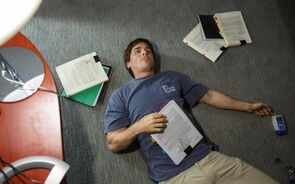Excertos de uma grande entrevista
7 mensagens
|Página 1 de 1
APM: How do you go about developing and testing new ideas?
Eckhardt: There are two parts to the process. The first part is to develop a coherent portfolio theory: how to structure your trades, how to manage risk, etc. That truly is a scientific project in which you’re trying to develop things from first principles. The second part is brainstorming for new trading ideas. It usually takes 70 to 100 false starts before we get something that we can use. I tell people that if you’re close to the North Pole, every direction you go in tends to be south. We’ve been doing this for a long time, so at this point, most things we test degrade our system. But every year or two, we’ll find something that actually improves it.
APM: What kind of new ideas are you looking for?
Eckhardt: The kind of innovation I’m talking about is inventing some new way of looking at the trend or the components of the trend, such as volatility. Even if it’s only a slight improvement, it can change all your systems. For example, estimating volatility determines to a large extent what your position sizes should be. In our case specifically, we have an erraticness filter which is influenced by volatility. A slight improvement in our volatility estimators can potentially produce a significant long-term benefit.
APM: You mentioned your erraticness filter. Can you explain that?
Eckhardt: Erraticness incorporates different measures of market spread. If market erraticness rises above a certain threshold, new trades in that market are blocked. This is designed to eliminate a subset of potential trades that we think will add to the portfolios’ volatility without contributing much to their returns.
APM: What effect has the erraticness filter had on your performance?
Eckhardt: We introduced the erraticness filter near the end of March 1996, and it turned out to be very beneficial. For the first few years after we implemented the erraticness filter, in examining our Sharpe ratio the numerator got bigger and the denominator got smaller simultaneously. In my experience, that’s very rare.
http://www.belmontinvestments.com/cimg/ ... erview.pdf
Remember the Golden Rule: Those who have the gold make the rules.
***
"A soberania e o respeito de Portugal impõem que neste lugar se erga um Forte, e isso é obra e serviço dos homens de El-Rei nosso senhor e, como tal, por mais duro, por mais difícil e por mais trabalhoso que isso dê, (...) é serviço de Portugal. E tem que se cumprir."
***
"A soberania e o respeito de Portugal impõem que neste lugar se erga um Forte, e isso é obra e serviço dos homens de El-Rei nosso senhor e, como tal, por mais duro, por mais difícil e por mais trabalhoso que isso dê, (...) é serviço de Portugal. E tem que se cumprir."
Re: Excertos de uma grande entrevista
canguru Escreveu:Estou a ver que o Ulisses não lê os posts do nosso amigo LTCM...
Bem me parecia que havia duas passagens que me eram familiares
Re: Excertos de uma grande entrevista
Ulisses Pereira Escreveu:Enviaram-me hoje, por mail, excertos de uma antiga entrevista com William Eckhardt, o homem que apostou contra Dennis Williams que o "trading" não podia ser ensinado e de onde nasceram as "turtles".
rsacramento Escreveu:Ulisses Pereira Escreveu:Mesmo sem saber a fonte, não posso deixar de publicar os tais excertos desta entrevista com um dos históricos traders.
a fonte é o New market wizards
Estou a ver que o Ulisses não lê os posts do nosso amigo LTCM...
Re: Excertos de uma grande entrevista
Ulisses Pereira Escreveu:Mesmo sem saber a fonte, não posso deixar de publicar os tais excertos desta entrevista com um dos históricos traders.
a fonte é o New market wizards
Muito bom Ulisses. Esta parte para mim é a mais importante:
E esta é contra intuitiva, mas bem verdadeira:
The desire to maximize the number of winning trades (or minimize the number of losing trades) works against the trader. The success rate of trades is the least important performance statistic and may even be inversely related to performance.
E esta é contra intuitiva, mas bem verdadeira:
As a general rule, losses make you strong and profits make you weak
Excertos de uma grande entrevista
Enviaram-me hoje, por mail, excertos de uma antiga entrevista com William Eckhardt, o homem que apostou contra Dennis Williams que o "trading" não podia ser ensinado e de onde nasceram as "turtles".
Mesmo sem saber a fonte, não posso deixar de publicar os tais excertos desta entrevista com um dos históricos traders.
O que ele diz serve de meditação, embora me pareça que só quem ande há algum tempo no mercado possa entender, em toda a sua plenitude algumas mensagens:
“If a betting game among a certain number of participants is played long enough, eventually one player will have all the money. If there is any skill involved, it will accelerate the process of concentrating all the stakes in a few hands. Something like this happens in the market. There is a persistent overall tendency for equity to flow from the many to the few. In the long run, the majority loses. The implication for the trader is that to win you have to act like the minority. If you bring normal human habits and tendencies to trading, you’ll gravitate toward the majority and inevitably lose.”
“It’s much easier to learn what you should do in trading than to do it. Good systems tend to violate normal human tendencies.”
“One common adage on this subject that is completely wrongheaded is: you can’t go broke taking profits. That’s precisely how many traders do go broke. While amateurs go broke by taking large losses, professionals go broke by taking small profits. The problem in a nutshell is that human nature does not operate to maximize gain but rather to maximize the chance of gain. The desire to maximize the number of winning trades (or minimize the number of losing trades) works against the trader. The success rate of trades is the least important performance statistic and may even be inversely related to performance.”
“The people who survive avoid snowball scenarios in which bad trades cause them to become emotionally destabilized and make more bad trades. They are also able to feel the pain of losing. If you don’t feel the pain of a loss, then you’re in the same position as those unfortunate people who have no pain sensors. If they leave their hand on a hot stove, it will burn off. There is no way to survive in the world without pain. Similarly, in the markets, if the losses don’t hurt, your financial survival is tenuous.”
“I know of a few multimillionaires who started trading with inherited wealth. In each case, they lost it all because they didn’t feel the pain when they were losing. In those formative first few years of trading, they felt they could afford to lose. You’re much better off going into the market on a shoestring, feeling that you can’t afford to lose. I’d rather bet on somebody starting out with a few thousand dollars than on somebody who came in with millions.”
“In many ways, large profits are even more insidious than large losses in terms of emotional destabilization. I think it’s important not to be emotionally attached to large profits. I’ve certainly made some of my worst trades after long periods of winning. When you’re on a big winning streak, there’s a temptation to think that you’re doing something special, which will allow you to continue to propel yourself upward. You start to think that you can afford to make shoddy decisions. You can imagine what happens next. As a general rule, losses make you strong and profits make you weak.”
“If you’re playing for emotional satisfaction, you’re bound to lose, because what feels good is often the wrong thing to do. Richard Dennis used to say, somewhat facetiously, “If it feels good, don’t do it.” In fact, one rule we taught the Turtles was: When all the criteria are in balance, do the thing you least want to do. You have to decide early on whether you’re playing for the fun or for the success. Whether you measure it in money or in some other way, to win at trading you have to be playing for the success.”
“Trading is also highly addictive. When behavioral psychologists have compared the relative addictiveness of various reinforcement schedules, they found that intermittent reinforcement – positive and negative dispensed randomly (for example, the rat doesn’t know whether it will get pleasure or pain when it hits the bar) – is the most addictive alternative of all, more addictive than positive reinforcement only. Intermittent reinforcement describes the experience of the compulsive gambler as well as the future trader. The difference is that, just perhaps, the trader can make money.” However, as with most affective aspects of trading, its addictiveness constantly threatens ruin. Addictiveness is the reason why so many players who make fortunes leave the game broke.”
“Don’t think about what the market’s going to do; you have absolutely no control over that. Think about what you’re going to do if it gets there. In particular, you should spend no time at all thinking about those rosy scenarios in which the market goes your way, since in those situations, there’s nothing more for you to do. Focus instead on those things you want least to happen and on what your response will be.”
Mesmo sem saber a fonte, não posso deixar de publicar os tais excertos desta entrevista com um dos históricos traders.
O que ele diz serve de meditação, embora me pareça que só quem ande há algum tempo no mercado possa entender, em toda a sua plenitude algumas mensagens:
“If a betting game among a certain number of participants is played long enough, eventually one player will have all the money. If there is any skill involved, it will accelerate the process of concentrating all the stakes in a few hands. Something like this happens in the market. There is a persistent overall tendency for equity to flow from the many to the few. In the long run, the majority loses. The implication for the trader is that to win you have to act like the minority. If you bring normal human habits and tendencies to trading, you’ll gravitate toward the majority and inevitably lose.”
“It’s much easier to learn what you should do in trading than to do it. Good systems tend to violate normal human tendencies.”
“One common adage on this subject that is completely wrongheaded is: you can’t go broke taking profits. That’s precisely how many traders do go broke. While amateurs go broke by taking large losses, professionals go broke by taking small profits. The problem in a nutshell is that human nature does not operate to maximize gain but rather to maximize the chance of gain. The desire to maximize the number of winning trades (or minimize the number of losing trades) works against the trader. The success rate of trades is the least important performance statistic and may even be inversely related to performance.”
“The people who survive avoid snowball scenarios in which bad trades cause them to become emotionally destabilized and make more bad trades. They are also able to feel the pain of losing. If you don’t feel the pain of a loss, then you’re in the same position as those unfortunate people who have no pain sensors. If they leave their hand on a hot stove, it will burn off. There is no way to survive in the world without pain. Similarly, in the markets, if the losses don’t hurt, your financial survival is tenuous.”
“I know of a few multimillionaires who started trading with inherited wealth. In each case, they lost it all because they didn’t feel the pain when they were losing. In those formative first few years of trading, they felt they could afford to lose. You’re much better off going into the market on a shoestring, feeling that you can’t afford to lose. I’d rather bet on somebody starting out with a few thousand dollars than on somebody who came in with millions.”
“In many ways, large profits are even more insidious than large losses in terms of emotional destabilization. I think it’s important not to be emotionally attached to large profits. I’ve certainly made some of my worst trades after long periods of winning. When you’re on a big winning streak, there’s a temptation to think that you’re doing something special, which will allow you to continue to propel yourself upward. You start to think that you can afford to make shoddy decisions. You can imagine what happens next. As a general rule, losses make you strong and profits make you weak.”
“If you’re playing for emotional satisfaction, you’re bound to lose, because what feels good is often the wrong thing to do. Richard Dennis used to say, somewhat facetiously, “If it feels good, don’t do it.” In fact, one rule we taught the Turtles was: When all the criteria are in balance, do the thing you least want to do. You have to decide early on whether you’re playing for the fun or for the success. Whether you measure it in money or in some other way, to win at trading you have to be playing for the success.”
“Trading is also highly addictive. When behavioral psychologists have compared the relative addictiveness of various reinforcement schedules, they found that intermittent reinforcement – positive and negative dispensed randomly (for example, the rat doesn’t know whether it will get pleasure or pain when it hits the bar) – is the most addictive alternative of all, more addictive than positive reinforcement only. Intermittent reinforcement describes the experience of the compulsive gambler as well as the future trader. The difference is that, just perhaps, the trader can make money.” However, as with most affective aspects of trading, its addictiveness constantly threatens ruin. Addictiveness is the reason why so many players who make fortunes leave the game broke.”
“Don’t think about what the market’s going to do; you have absolutely no control over that. Think about what you’re going to do if it gets there. In particular, you should spend no time at all thinking about those rosy scenarios in which the market goes your way, since in those situations, there’s nothing more for you to do. Focus instead on those things you want least to happen and on what your response will be.”
7 mensagens
|Página 1 de 1
Quem está ligado:
Utilizadores a ver este Fórum: Bing [Bot], Google [Bot] e 61 visitantes




